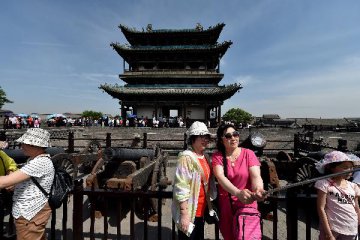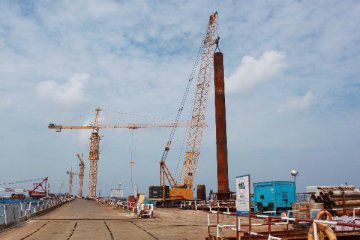
Caterpillar Inc. hasn't taken its eyes off China since it sealed a deal to sell 38 pipelayers in 1975. Now with more than 20 plants, three R&D centers and over 10,000 employees in China, the U.S.-based equipment manufacturer has witnessed China's opening up and shared in its growth opportunities for decades.
"The market is becoming more and more open and competitive, which in the long term will have a positive impact on all the players in the marketplace," Caterpillar Vice President and Chairman of Caterpillar China,Chen Qihua, told Xinhua in an exclusive interview Tuesday.
This comes as no surprise, as China has made constant efforts to optimize the business environment for overseas investors since the implementation of the reform and opening up policy in the late 1970s.
In the early stage of opening up, China granted overseas investors "super-national treatment," with tax incentives and other preferential policies unimaginable for domestic businesses.
Although those privileges were phased out as the government let the market play a bigger role, they fueled the fast growth of foreign direct investment (FDI) in China. FDI inflow rose from 40.7 billion U.S. dollars in 2000 to 126 billion dollars in 2016, according to the National Bureau of Statistics.
The inflow last year was the third largest in the world behind the United States and Britain, said a report from the United Nations Conference on Trade and Development.
In 2016, China amended foreign investment laws and unveiled measures to simplify approval procedures for foreign companies.
In this year's government work report, China made new commitments to opening its gates wider to the outside world and improving the environment for foreign investors.
Foreign companies will be allowed to be listed and issue bonds in China and to take part in national science and technology projects, the report said.
"Caterpillar has enjoyed growth in China for more than 40 years," Chen said.
Earlier this year, the company announced new investment for a facility expansion at its mini-excavator plant near Shanghai. U.S. chemical giant Dow has had a similar experience.
"We have achieved some significant milestones of our business and operations in China, which are solid proof points of an evolving and better business environment in the country," said Yoke Loon Lim, Dow Greater China President.
In 2016, Dow invested to build two new facilities in China. Last month, Dow broke ground for a formulated Polyol plant expansion project. Early this month, China's Ministry of Commerce granted conditional regulatory approval for the proposed merger of equals between Dow and DuPont, which will make the company "better positioned to align with China's needs in economic transformation," Lim said.
The better environment in China was also corroborated by the Doing Business report made public by the World Bank Group last year, showing China's ease of doing business ranking at 78th among 190 economies, improving from 84th in the previous year.
Despite the clear improvement, the ranking also showed that the country's business environment is far from perfect.
"What we look for is a level playing field, continued open market, as well as inclusion," Chen said.
China's door will continue to open wider, and China will keep working to be the most attractive destination for foreign investment, according to the government work report.
China has also vowed to treat foreign companies the same as domestic companies when it comes to license applications, standards-setting and government procurement, and grant them the same preferential policies under the "Made in China 2025" initiative.
Caterpillar is actively seeking to participate in the initiative and to help build China into a manufacturing power. A few of its facilities in China have applied for pilot projects.
"From a long-term perspective, China is a very attractive market which has very bright prospects and great potential, considering its sheer size of the market, its steady economic growth and the government's initiative to enhance economic growth quality," Chen said.























Latest comments